How AGT is Surviving a Pandemic
By Joan Tupponce
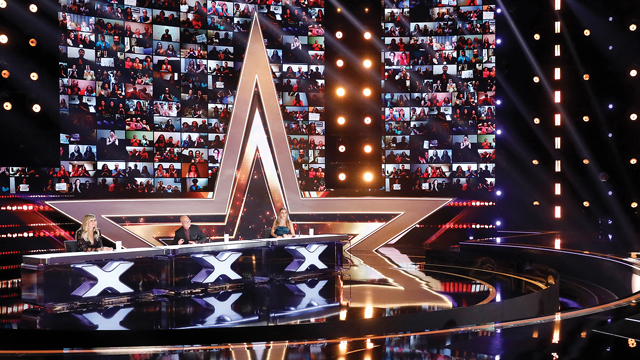
Executive producers of America’s Got Talent are used to dealing with death-defying acts. But a pandemic? Not so much.
This season has been anything but ordinary for the television industry. But America’s Got Talent is one show that has worked within all government regulations and safety guidelines and carried on with confidence.
This season – AGT’s fifteenth – started in typical fashion. The show’s executive producers, Sam Donnelly and Jason Raff, traveled the country from last October to this January looking for talent to put in front of the show’s four celebrity judges: creator and executive producer Simon Cowell, Heidi Klum, Sofía Vergara, and Howie Mandel.
“We got through that process fine,” says Raff.
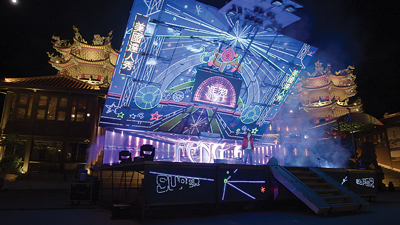 Then COVID-19 took hold and parts of the country went under shelter-in-place orders. Like others when the pandemic first hit, the show’s producers thought it wouldn’t be too long before they could resume a normal schedule. But normal wasn’t in the cards.
Then COVID-19 took hold and parts of the country went under shelter-in-place orders. Like others when the pandemic first hit, the show’s producers thought it wouldn’t be too long before they could resume a normal schedule. But normal wasn’t in the cards.
“At the time, we were sure the shelter-in-place would be a couple of weeks,” Raff says. “That didn’t happen. We had to change up the format. We were one of the first productions in California to start up under the new regulations and guidelines.”
With the early part of the season already taped, television viewers were able to watch the majority of the auditions that took place in front of the celebrity judges, which included two Virginia acts – Richmond-based a capella trio Resound and dancer Noah Epps from Ashburn in Loudoun County.
Then, Raff says, “Everything changed as to how we work.”
In the early days of the pandemic, when everything was shut down and information and guidance about reopening were scarce, Donnelly and Raff did a lot of brainstorming for ideas.
“As producers, our job was to be problem solvers,” Donnelly says. “This is the ultimate problem. It was definitely a big challenge. We are very proud of how everyone has taken that challenge and turned it into something quite good.”
No one knew what was going to “come down when the rules came out,” she adds.
As soon as those state agency rules were released, the show was loaded in and ready to go the following week.
Donnelly and Raff knew they wouldn’t be able to utilize the Dolby Theatre in Los Angeles, where the live shows usually take place. What did come up in conversation was the idea of using the lot at Universal Studios Hollywood. “That gave us solutions that were safe and outside. We had the entire theme park and back lot at our disposal,” Raff says.
Once the team embraced the idea, Donnelly remembers how the studio lot turned into an incredible playground. “We can spread out, and we are saying on the shows that we are in a studio and on the lot,” says Donnelly. “The theme park has been such a great partner.”
Keeping everyone safe and ensuring the show had the same feel as normal were still hurdles that needed to be addressed. Producers appreciated that contestants having a live audience for their performances was a big part of the show, but that was out of the question. According to Raff, plans for a virtual audience immediately took shape.
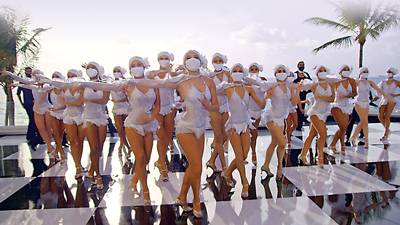 When contestants performed in the studio in front of the celebrity judges, they were surrounded by hundreds of home-based audience members in a checkerboard-like grid. The reactions of the virtual audience members – whether it was clapping, yelling, or booing – sounded as if it was live in the studio.
When contestants performed in the studio in front of the celebrity judges, they were surrounded by hundreds of home-based audience members in a checkerboard-like grid. The reactions of the virtual audience members – whether it was clapping, yelling, or booing – sounded as if it was live in the studio.
Scoring a Win
Acts that made it to the live shows in Universal were motivated not only by the exposure they receive from being on AGT, but also by the $1 million grand prize and the opportunity to headline a show in Las Vegas. Several past contestants – winners and non-winners – now have a residency in Vegas: magicians Mat Franco, Shin Lim, Piff the Magic Dragon, and ventriloquist Terry Fator, to name a few.
“You don’t have to win to have the show change your life, as many acts that have come in second, fourth, fifth, and have gotten that exposure and used it to their advantage,” Raff says.
Donnelly and Raff travel to Las Vegas frequently. “We see billboards and people that have been on the show, and I have an incredible sense of pride. These are our acts out there,” Raff says.
AGT is able to give contestants a spotlight, and Donnelly says that’s a good position to be in. “They have the talent. What I love so much is that there is a family atmosphere on the show. People are always happy to come back and be involved in the show. The show doesn’t flourish and grow in the way we need if they don’t have a good experience.”
Creative Partnerships
Putting the show together each season involves a partnership between the acts and AGT’s music and creative teams. The idea comes from the talent, but the acts don’t know what resources are available, says Donnelly. “It’s very much a collaboration, and that’s what it should be. We are able to give people resources to create the best version of their act. That is one of the things that is a special part of the show.”
Each year, a team of producers sees tens of thousands of acts in person and also videos of acts that have been sent to the show. “We see between 30,000 and 49,000 acts a year,” says Raff. “Just to get to be seen by the judges is a huge accomplishment.”
Donnelly and Raff are always looking for that surprise. “Sometimes we see the same acts. They may not be ready one year. They come back another year and are ready. There are people we have been tracking for years that are on the show now,” Donnelly says.
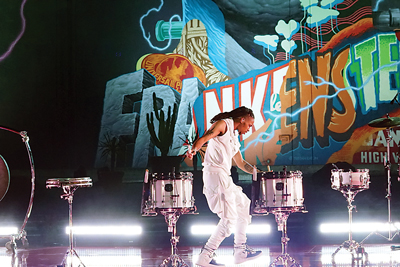 Once producers have seen all the acts, they have to pare down the number of acts that can audition in front of the judges – about 200 to 300, depending on the season. “Each of these slots is a potential life-changer,” Raff says.
Once producers have seen all the acts, they have to pare down the number of acts that can audition in front of the judges – about 200 to 300, depending on the season. “Each of these slots is a potential life-changer,” Raff says.
Both Virginia acts – Resound and 12-year-old dancer Noah Epps – stood out to producers. One of the show’s producers had been following Resound and was a fan of the trio. “For her, they had something really unique,” Donnelly says. “They took all surprising genres of music and gave it their own sound. They interpret popular music in a different way.”
Epps had that surprise element that charmed producers. “He has been a huge viral video hit,” Raff says. “As of August 27, he had 163 million-plus views across all social media.”
Global Opportunities
Currently, there are more than seventy local versions of Got Talent produced across Europe, Asia Pacific, the Middle East, Africa, and the Americas. That worldwide network came in handy this season as some acts were under COVID-related stay-at-home orders in their home location and couldn’t make it to the live show.
“We filmed in Australia, working with our colleagues in Australia’s Got Talent,” says Donnelly. “When we filmed the dance act, Bad Salsa, we worked with friends and colleagues at India’s Got Talent. It was a nice added layer for us. We’ve seen people from all over the world come together.”
The show has also filmed in Florida and much farther from home, in Taiwan. “It’s definitely been a real international accomplishment,” Raff says.
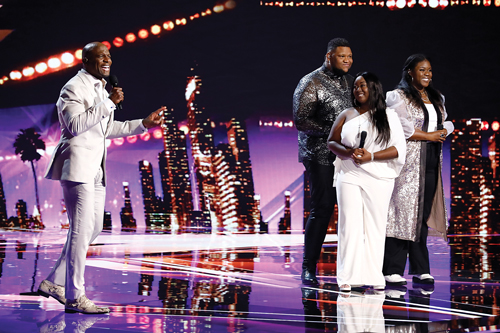
RVA’S RESOUND TAKES THE STAGE
Preparing for AGT’s live show in August was a nerve-racking experience for the three members of Richmond-based Resound. “It definitely was a new experience for everybody,” says Joe Clarke, a member of the group with Mariah Hargrove and Jessica Fox. “Everybody was nervous traveling [they flew from Richmond to Los Angeles], but we had that fight inside of us because we wanted to show America what we had. We haven’t regretted any experience we’ve had for the show. We are grateful for the opportunity.”
The group started its AGT journey earlier this year before the pandemic hit. Their audition for the celebrity judges aired on NBC in June.
After they finished singing the 1960s-hit What the World Needs Now is Love, the audience and all four judges gave them a rousing standing ovation. “We went on to grab the hearts of the judges and audience,” says Hargrove.
Becoming a Trio
All three members have been singing since they were young. Fox, thirty, and Clarke, twenty-nine, both grew up in Mechanicsville and graduated from Hanover High School. Fox is also a graduate of Virginia Commonwealth University.
In high school, Fox and Clarke performed with the chamber chorus. Clarke was also in show choir, and Fox was in the all-girl jazz group, Satin Dolls.
Hargrove, twenty-six, grew up in the city of Richmond and later moved to Varina. She graduated from J.R. Tucker High School with honors and is now studying through Ashford University’s online degree program.
The three formed Resound in 2014 after singing background for a play and posting a rehearsal video for a church performance on their social media pages. “We kept doing videos and after a while, people were asking [if we had a] name and Jessica came up with it,” Hargrove says.
They went full-time with the group in 2018 and have produced one album, First Christmas, that includes the song they featured on AGT.
Waiting for the Call
This summer, while waiting to hear from AGT about their fate on the show, the group spent time doing virtual concerts, studio sessions and personalized Resound-a-gram birthday greetings. “We write the song depending on what the people give us and then we send it out to them,” Hargrove says.
They also performed during the protests and demonstrations for racial justice in Richmond. “We’ve been singing a lot of songs of power and hope,” Hargrove says.
The long-anticipated call from Simon Cowell’s AGT team came in July and the group had to wait for Cowell himself to join the call. “We were put into a virtual waiting line,” Hargrove says.
After a few hours, Cowell gave them the good news that they were moving forward to the live shows. “We started screaming at the top of our lungs,” Hargrove says.
Performing Live for AGT
The group had seven days to prepare for the show. Much of that time was spent in rehearsals and production meetings.They went onto the stage confident in their performance, says Fox. “There was a level of nerves, but we felt like we had a chance.”
On the live show, they performed the song Follow Me, originally done by Andrea Bocelli and his son. “It had been done as a duet, but we had to take the approach as a trio,” says Hargrove. “We enjoyed it because it shows the kind
of stuff we love to do. We also love doing Broadway and film songs. We loved the way we sounded on this, and we loved how beautiful the scenery was and how everything came together.”
After being told they were one of three acts that had to go to the show’s Dunkin Lounge and wait for one act to be saved by America, they had only thirty minutes to round up folks to vote for them. “We had so much support from the Richmond area,” says Clarke.
When the three acts were called onstage, singer Celina was the one saved by America. “We are fans of hers. We love her talent. We had genuine praise that we wanted to show her,” Clarke says. “After she left the stage, it was between us and the acrobatic trio the Bello Sisters.”
It was the last minute of the show when judge Howie Mandel cast the deciding vote for the Bello Sisters to move to the AGT semi-finals, leaving Resound to head home.
Even though they didn’t move forward in the competition, Hargrove believes the AGT platform is useful for the group. “It was disappointing to get the news we got, but this is just another step in our journey,” she says, adding, “Our purpose has been fulfilled in this place.”
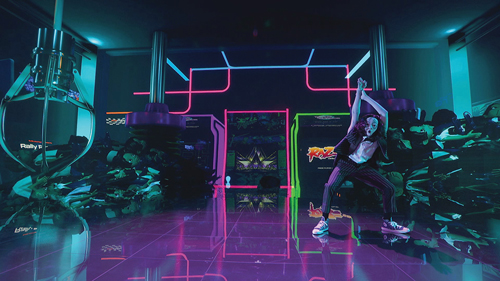
NOVA DANCER MAKES HIS MARK
Twelve-year-old dancer Noah Epps from Ashburn, Virginia, had tried out for AGT three years in a row, starting in 2017. He finally made it in front of the celebrity judges in March of this year.
For his audition, he portrayed a Pinocchio-style marionette that morphed from puppet to real boy to a mutant being. “It was an evolution,” says Epps. “It’s something that goes beyond.”
His dance routine involved what’s called bone-breaking (think contortionist-style, wince-inducing moves in the style of flexing), as well as other forms of dance. His mom, Natasha, and dad, Brandon, were a big part of the creative process. “My dad looked up ideas for the costume and did my makeup,” Noah says.
“Noah had the final approval,” says his dad. “We used YouTube and Google for gathering ideas. It was an experiment until we were happy with the look.”
Stepping onto the stage in front of the judges for the first time was nerve-racking, Noah says. “When I got to stand still and witness the crowd, it wasn’t scary at all. I felt super comfortable.”
Always a Dancer
“Noah has always been ahead of time in years,” says his dad. “At two, his speech was very advanced for his age. His character followed suit. He’s always been open to trying new things. He’s always had that spark of being an entertainer.”
Epps and his wife knew their son was double-jointed when he was a baby just by the way he slept, his dad says. “When he was four, you could see the mobility in his shoulders.”
Noah’s love of dance started in first grade when the kids in his class started dancing during recess. When the other kids wouldn’t let him join in, he asked his dad if he could sign up for dance classes. He also began taking taekwondo and “stuck with that for years,” his dad says. “I ended up joining the class and we got our black belts together. It was a big bonding time for us.”
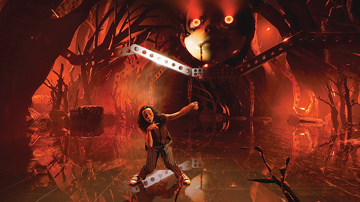 Noah was still taking taekwondo when he started learning bone-breaking techniques. He also took classes in everything from hip-hop to ballet. “Ballet helps me with balance and helps me express emotion,” Noah says.
Noah was still taking taekwondo when he started learning bone-breaking techniques. He also took classes in everything from hip-hop to ballet. “Ballet helps me with balance and helps me express emotion,” Noah says.
He attended dance conventions to learn different choreography in addition to different styles of hip-hop and street dances. “I’ve been competing for four years,” he says.
Noah’s dad has always been proud of him every step of the way. “When I watch him do what he loves and be successful, I always have a smile on my face,” he says.
Moving Forward
Noah’s creativity was on full display during AGT’s live show. Director Tim Burton served as Noah’s inspiration for dancing to the song Back to You. Noah put the routine together in about two weeks, once the music was approved.
“The concept we did was on such a different level,” he says. “We pushed the creative envelope.”
He felt good going into the routine. “I said in my head, I got this and I can do this right,” he says. “I was mainly relaxed. I was trying to suppress any anxious feelings.”
After he finished, he felt confident in his performance. “I felt it was worthy of going to the semi-finals. I was happy about it,” he says.
When Noah found out he didn’t make the semi-finals, he celebrated with singer Kenadi Dodds who did advance. “I wasn’t disappointed,” he says. “I wanted to give the other person praise. Even if I didn’t make it, being on the show was a benefit either way it went.”
What will he do next? He wants to start a nonprofit organization that will help kids “who can’t afford dance or acting class or are too ill to take dance,” he says. “I want to use my platform to give back. I want to give kids who have a struggle and can’t chase their dreams hope so they can chase their dreams.”
To perform on AGT was a dream for Noah, he says. “It was an opportunity of a lifetime. I will continue to dance. This is not the end.”
Photos: courtesy NBCUniversal Media
